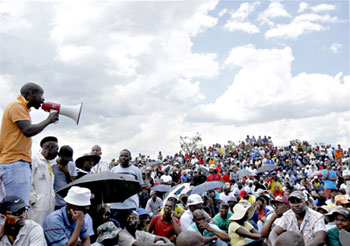(front page)
S. Africa: 100,000 miners
refuse to end their strike

|
|
Reuters/Siphiwe Sibeko
|
|
Strikers against AngloGold Ashanti, Carletonville, South Africa, Oct. 19. Miners make less than $1,000 a month for 12- to 16-hour days, said miner Tshepo Motloi, “which is totally peanuts.”
|
BY SETH GALINSKY
Some 100,000 gold, platinum, coal, chrome, diamond, and iron miners in South Africa are refusing to go back to work until their demands for substantial pay hikes are met. Some of the strikes began in August, others just in the last few weeks. About 19,000 workers at two gold mines, however, ended their strike after the company threatened to fire them.
All the mine strikes are “unprotected,” meaning they have taken place before the expiration of union contracts. In many mines workers have selected strike committees independent of the established unions.
AngloGold Ashanti, the third largest gold company in the world with operations in 10 countries on four continents, said it would increase wages by about 500 rand ($57) by moving many workers up one pay grade. AngloGold’s operations have been totally shut down by the strike.
The company gave thousands of strikers an ultimatum to return to work under the new offer by Oct. 24 or be fired, saying that workers’ demands to increase their wages from 8,000 rand ($927) a month to between 12,500 and 18,500 a month “are totally unaffordable.”
AngloGold’s mines in South Africa are the deepest in the world. Miners often have to walk more than a mile to their work site after traveling up to an hour and a half down the mine elevators.
“It’s basically hell down there,” miner Tshepo Motloi, on strike since Sept. 25, told the Militant in a phone interview from near Carletonville. “The ventilation is inadequate and a whole lot of people get sick from TB. It’s so hot, sometimes I drink six liters of water a day. I’ve witnessed people die from heat stroke, but still production has to go on.”
“A qualified miner earns about 8,000 rand a month for working 12 to 16 hours a day, which is totally peanuts for the air and dust that you breathe,” Motloi said. “You put out gold that’s going to make somebody else rich, but you cannot get proper health care for your children, you cannot give your wife what she deserves.”
At least a dozen AngloGold strikers have been arrested by the cops over the last week, including strike committee leader Solly Malejane, who is charged with incitement of violence. “That’s an apartheid era law that the government is using now,” Motloi noted. Malejane was released Oct. 23.
“I’m not saying that the miners make a lot of money,” AngloGold spokesperson Alan Fine said in an Oct. 22 phone interview, “but real wages have increased 2.8 percent a year since the advent of democracy in 1994,” referring to the elections that marked the end of the white supremacist regime in South Africa and brought the African National Congress to power.
Fine claimed that AngloGold “has made a lot of progress” lowering rates of silicosis, a debilitating disease especially prevalent among gold miners. More than 288,000 miners in the country suffer from the disease.
Fine admitted that miners with silicosis who can no longer work don’t get paid. Instead, they receive a lump sum equal to two weeks pay for each year of service. Although by law they are supposed to get free medical treatment, Fine said, since most of the mines are in rural areas “that doesn’t really work out particularly well for them.”
When asked if the company would negotiate with the strike committee selected by the workers, Fine said that the company was aware of the committees, “but we don’t have any kind of approach to them in formal terms.”
Miners’ ‘benefits’
Some 19,000 workers at two out of three mines owned by Gold Fields that had been on strike since September, returned to work by Oct. 18, the company said. But not 8,500 workers at the company’s KDC East mine, who went on strike Oct. 14 demanding that 100 workers arrested by the cops during their previous one-week strike in September be released and charges against them dropped.
Gold Fields, the fourth largest gold mining company in the world, said it would move workers to a higher pay grade than they had before the strike, but has also fired 1,500 workers who did not show up by the company’s deadline.
“Let’s look at the economic reality,” Gold Fields spokesman Sven Lunsche told the Militant. “Many foreign investors, including from the U.S., are selling their shares. The labor situation of the last few months is unsustainable. If it continues you will see more than half the mines shut down.”
“The miners earn more than the majority of South Africans and get lots of benefits,” he claimed, including free housing if the miners live in company-owned hostels.
But the single-sex hostels are hated by mineworkers. Motloi said that “three or four sleep in one room. It’s regimented. You get in line to get food, you take whatever they give.”
The miners have faced opposition to the strikes by officials of the government-allied National Union of Mineworkers and the Congress of South African Trade Unions.
In a summary of decisions taken at an Oct. 15-16 conference, the COSATU Central Executive Committee blamed the wave of strikes on what it called Impala Platinum’s “foolish step” of agreeing to an 18 percent wage increase for some workers at its mines following an unprotected strike in February.
On Oct. 16, the 1,800 miners at Petra Diamond’s Cullinan mine went back on strike demanding a pay increase to 12,500 rand a month. They had ended a short sit-in strike early in the month at the request of the NUM leadership.
Related articles:
London: 100,000 join march to protest joblessness, gov’t austerity
On the Picket Line
|



